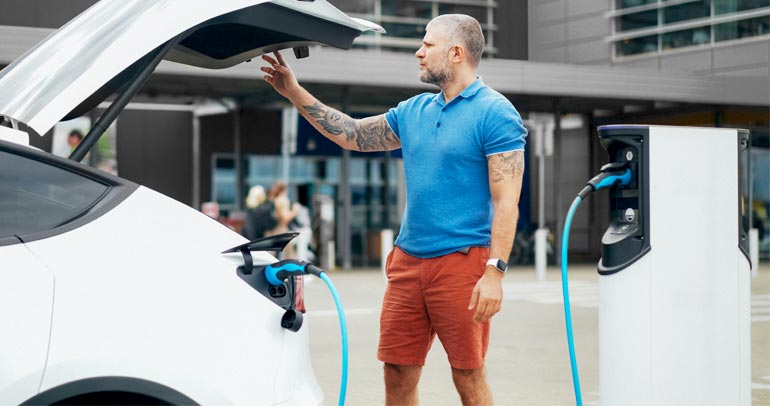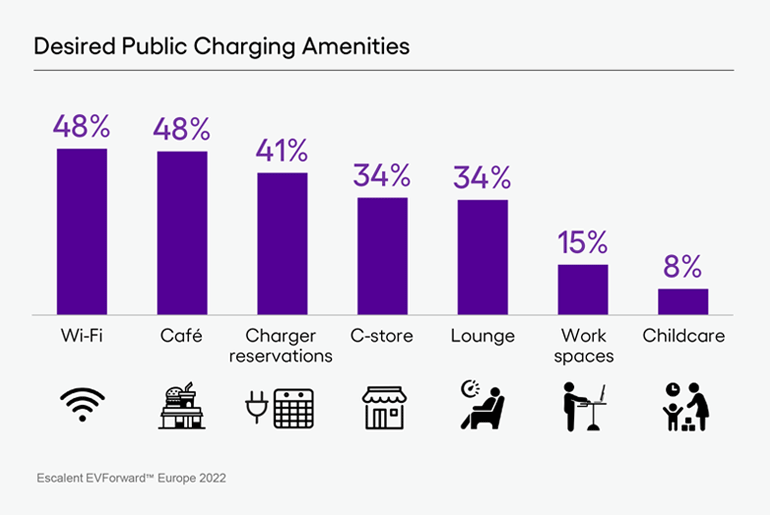
European energy providers, including utilities as well as oil and gas companies, are nervously watching the growth of e-mobility across the continent with an eye toward the implications for their businesses. In the second wave of our annual EVForwardTM Europe study that surveys 10,000+ new car buyers across the UK, Germany, France, Italy and Spain, we found 29% are BEV Intenders—consumers who are 15 times more likely than the average new car buyer to shop for and purchase a BEV as their next vehicle. The European Parliament’s recently adopted law to eliminate tailpipe emissions by 2035 will only accelerate the transition to BEVs.
Against this backdrop, it’s important for energy providers to understand how “fueling” will happen for new BEV owners and how energy providers can adapt their business in response.
BEV Home Charging Challenges and Opportunities
70% of buyers say they anticipate “all” or “most” of their charging will happen at home, but that figure disguises a significant 52% who say they’d do “most” of their charging at home—meaning there is opportunity outside of the home for energy providers to support these buyers.
Despite these expectations, home charging remains a barrier to purchasing a BEV for many consumers—overall, 17% cite access to charging at home or work as a barrier.
Dwelling circumstances have a meaningful impact on the ability of customers to charge at home, regardless of their preferences:
- 9% of buyers park on-street and 47% of those don’t have access to charging.
- A further 9% have dedicated on-street parking, with 39% having no access to charging.
- 22% have private communal parking, with one-third having no access to charging.
Similarly, 37% are apartment dwellers—a number on par with detached homeowners. 38% of apartment dwellers have no access to charging versus the 17% of homeowners who don’t.
Clearly, home charging is both a barrier to Europe’s e-mobility goals and an opportunity for energy providers to capture a new market in providing solutions that respond to customer needs.
Rethinking Public BEV Charging
Turning back to charging outside of the home, 22% of buyers cite “access to public charging/refueling” as a barrier to BEV adoption.
Existing BEV owners are interested in the prospect of a charging network that resembles the appearance and density of a petrol filling station, with 79% very or somewhat likely to use one. This idea of creating a “petrol station-like” experience reflects what buyers want as amenities at public charging locations.
Delivering Public Charging Amenities Consumers Want
Energy companies have already started to experiment with public charging locations that respond to the needs and desires of the newly e-mobile.

At the recent EV Charging Infrastructure 2023 Asia-Pacific conference at which I was a speaker, Min Yih Tan from Shell spoke about supporting the ecosystem for current and future BEV owners by providing green electricity and charging at home as well as public charging that is a “full experience” with, for example, coffee and snacks for drivers as they charge their vehicles.
Shell has shown an example of what this might look like with its recently opened EV charging hub on Fulham Road in London, UK. This station, featuring nine 175 kW DC fast chargers for BEVs, also provides an on-site café with Wi-Fi.
Taking a Broad View to BEV Charging Needs
Successful energy companies will, like Shell, take a broad view of the “fueling” needs of future BEV owners and respond in kind. A narrow focus limits the opportunities to generate—or maintain—brand loyalty and, ultimately, to have a sustainable business model.
If you’re interested in learning more about the findings from our 2022 EVForward Europe report and how they can help you build successful BEV charging programs for the future, please reach out to us by clicking the button below.
About EVForward™ Europe 2022
The second annual wave of the EVForward Europe study was conducted across five European countries: United Kingdom (n=1,941), Germany (n=2,011), France (n=1,723), Italy (n=1,915) and Spain (n=1,806). It was a market-representative sample of 9,396 respondents and included a survey that fielded from July to August 2022. Respondents are ages 18 to 80 with a primary vehicle model that’s 2016 or newer, and all intend to purchase a new vehicle within the next five years. Data were weighted by age and gender to match the demographics of the new-vehicle buyer population and by vehicle segment to match current vehicle sales. The sample for this research comes from an opt-in, online panel. As such, any reported margins of error or significance tests are estimated and rely on the same statistical assumptions as data collected from a random probability sample. Escalent will supply the exact wording of any survey question upon request.
After two years of research, the total EVForward Europe sample now includes more than 19,000 new-car buyers across Europe, adding to the 30,000+ new-car buyers in the United States.









